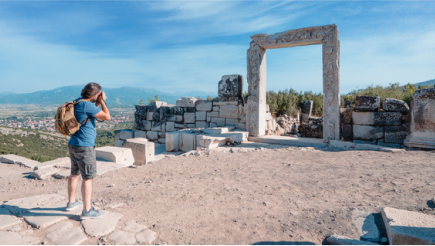
Learn architectural history with online courses
What do the designs of different structures say about the societies and cultures of people throughout time? If you’re interested in exploring a dynamic aspect of world history, you can learn architectural history with online courses from edX.

What is architectural history?
Architectural history studies the evolution of architecture over the centuries in different parts of the world. From the ancient Mesopotamians, Egyptians, and Greeks, to modern civilizations, it serves as the foundation for architectural studies at the university level. Because structures and dwellings are among the chief artifacts that any society leaves behind, the history of architecture is, at its essence, a history of human civilization.
An architectural historian has an understanding of various structural subtypes, such as religious architecture, landscape architecture, civil architecture, naval architecture, and military architecture. By gaining an appreciation of how history, culture, and geography have shaped the world around us, architects can create better designs that will stand the test of time.
Browse online Architectural History Certificates
Find new interests and advance your career opportunities
Stand out in your field
Use the knowledge and skills you have gained to drive impact at work and grow your career.
Learn at your own pace
On your computer, tablet or phone, online courses make learning flexible to fit your busy life.
Earn a valuable credential
Showcase your key skills and valuable knowledge.
Certificates
Related Topics
Architectural history course curriculum
Whether you are simply interested in the topic or plan to begin a career in the field, you can study the history of architecture with online courses offered through edX.
Introductory courses in architectural history can cover architectural imagination, technology’s impact on architecture, and architecture’s relationships to social and contextual history. They may provide learners with opportunities to analyze architecturally significant buildings, and provide hands-on exercises in drawing and modeling. Specialized courses can explore the history of notable structures like the Pyramids of Giza or delve into the trends and challenges that have impacted modern building design, like earthquakes and other natural disasters.
From individual courses to specialized boot camps to full degree programs, edX offers a range of online learning formats on many different subjects that can facilitate personal and professional growth. Explore the many different learning opportunities made available through edX.
Explore architectural historian jobs
With expertise in architectural history, you can pursue a variety of roles, such as architectural conservator, architectural historian, museum curator, architectural drafter, or architectural specifications writer. These jobs involve conducting historic property surveys, identifying historic properties, and performing fieldwork. Other related roles that benefit from knowledge of the history of architecture are cultural resource specialists, historic preservation specialists, and architectural designers.
While learning the history of architecture on its own or in conjunction with a degree in art, architecture, or history can help prepare you for these jobs, each position is unique and will have its own educational and skills requirements. For example, museum technician jobs typically require a bachelor’s degree while archivists, curators, and conservators usually need a master’s degree.1 Before deciding on a specific learning path, it’s important that you research potential positions that you are interested in and align your coursework with your professional aspirations.
More opportunities for you to learn
We've added 500+ learning opportunities to create one of the world's most comprehensive free-to-degree online learning platforms.
Frequently Asked Questions
How to Become an Archivist, Curator, or Museum Worker. (2022). U.S. Bureau of Labor Statistics. Retrieved April 10, 2023.